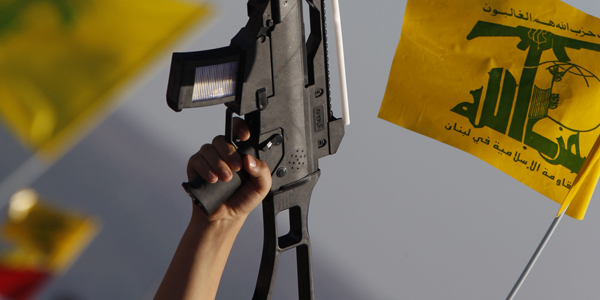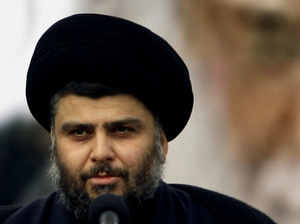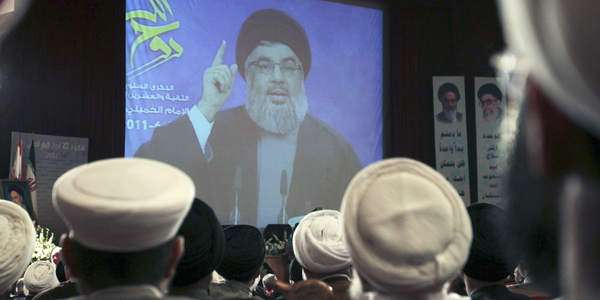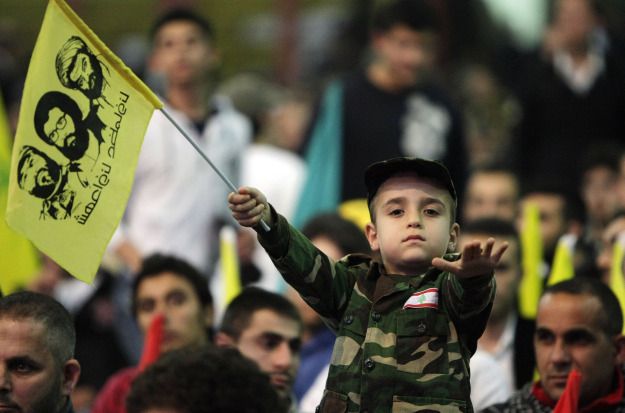Hezbollah after Bashar
BEIRUT, Lebanon — Hezbollah supporters have been watching the turbulence next door in Syria with apprehension. Rhetorically, the Lebanese Party of God has backed its patron in Damascus, although its embrace has grown tepid of late. But Hezbollah was worried enough to shift its weapons caches from Syria into Lebanon, reportedly, and its emissaries have been working behind the scenes to mend relations with Syria’s opposition. At the core of their worry is a sectarian concern: Syria without Bashar al-Assad might be willing to jettison Hezbollah — after all, Syria is a majority Sunni nation, and Hezbollah is a Shia standard-bearer.
“The Islamists who are fighting against Bashar Assad are not going to support us if they take power,” one Hezbollah partisan told me recently in Lebanon. “They might believe in resistance against Israel, but they won’t support our resistance.”
If, or more likely when, Assad’s government finally falls to the uprising that has shaken Syria for more than half a year, its successor will renegotiate Syria’s regional relationships. Assad’s long-time friends and clients have good reason to feel insecure. A more democratic Syria would represent the country’s Sunni majority, which includes a fair number of Islamists. They likely won’t share all the priorities of Assad’s brutal minority regime, whose commitment to secular government conveniently justifies its manic clinging to absolute authority.
A Syria led in part by the Muslim Brotherhood, or by a confederation of anti-Assad forces, would probably continue to support resistance movements that fight Israel, and would likely continue relations with Iran (and, possibly, pursue warmer relations with Iraq). But it might be less vested in the ideological absolutism of the existing “Axis of Resistance,” led by Hezbollah and Iran, and more interested in a new Arab nationalist front, which could unite Egypt, the Palestinians, and other post-dictatorial Arab states in an alliance that opposes Israel and some American projects from a less bellicose footing.
The threat to Hezbollah is tangible, and has broad regional implications.
NPR: Sadrists follow Hezbollah
Kelly McEvers has a story on NPR about Moqtada Sadr’s methods; he seems to be borrowing directly from Hezbollah’s playbook, and I discuss in an interview with Kelly all the potential for power and long-term pitfalls Hezbollah’s approach entails.
At a recent press conference, Iraq’s minister of planning, Ali Youssef al-Shukri, stepped to the podium, gave a brief and somber blessing, and announced the issue of the day: a new mechanism for quality control of imports to Iraq.
Shukri spoke softly and wore a pressed suit. The former academic has spent time in the United States, on a State Department program for international leaders. One could hardly guess that he belongs to the party of Muqtada al-Sadr, the Shiite cleric best known for fierce battles against U.S. troops during the war and violent threats against the American presence in Iraq that continue today.
Analysts say the planning minister is the new face of Sadr’s party, which now holds 40 out of 325 seats in Iraq’s Parliament. They say Sadr is following in the footsteps of other Islamist groups in the region — namely, Lebanon’s Hezbollah.
Remaking a militant group’s image starts with recruiting middle-class technocrats into the party’s ranks, says Thanassis Cambanis, author of A Privilege to Die: Inside Hezbollah’s Legions and Their Endless War Against Israel.
With Hezbollah, “militants, fighters and ideologues who were leading the party would be happy to assign an obscure dentist or biochemical professor to an important portfolio in Parliament or in the government — if that person could do a better job,” he says. “This lack of ego was a big part of their success.”
It’s a success Cambanis says Sadr hopes to copy. If, say, Iraq’s Planning Ministry can show it’s combating corruption by controlling imports, then the people will continue voting for Sadr’s party.
Hezbollah’s Legitimacy Under Threat
Just a year ago, Hezbollah was sitting pretty. Lebanon’s Party of God had consolidated its influence across the Arab world with a durable set of alliances. Its Axis of Resistance, formed with Iran, Syria and Hamas, had emerged as the most credible and authoritative force in Middle Eastern politics. Its central idea—to mobilize self-reliant communities around a frontal confrontation with Israel—seemed to be setting the region’s agenda.
But the Arab Spring changed the rules of the game that Hezbollah so masterfully played for the last two decades. Today, the party faces perhaps the biggest threats to the legitimacy it has worked so hard to cultivate among cadres, casual supporters and even the political opponents who have come to grudgingly respect the effectiveness of its leader, Hassan Nasrallah.
The first, and more short-term, challenge comes from Syria, where a tottering Assad regime could severely curtail Hezbollah’s military room for maneuver. The second, more enduring, issue is the Arab political renaissance underway, which could produce movements well positioned to steal Hezbollah’s anti-Israel thunder with a resistance program free from the party’s sectarian, militant baggage.
Ian Masters Show
Ian had me on his show on Wednesday to discuss the Special Tribunal for Lebanon indictments. He’s particularly interested in the possibility for a regional war now, provoked by an Israeli attack on Iran, or by the Assad regime and Hezbollah because of the domestic threats they face. My view is that Hezbollah would be unlikely to start a war with Israel on behalf of one of its foreign sponsors – Syria or Iran – but it might fear the collapse of the Assad regime could threaten Hezbollah’s military viability. I also believe the Tribunal indictments don’t pose a serious challenge to Hezbollah anymore. (I’ve written an extended version of this argument which should be published soon in The National Interest.)
You can listen to the Ian Masters show here.
Hezbollah Is In Trouble
During the six turbulent years since Rafik Hariri was blown up on the Beirut waterfront, supporters of the outspoken billionaire former prime minister longed for the day that his killers would face justice.
But the indictments submitted this week by the UN-mandated Special Tribunal for Lebanon hit with more splutter than splash. In the short term, Hezbollah will face minimal fallout from the charges against two of its officials, which the Tribunal named as ringleaders in the assassination.
The more serious threats to Hezbollah’s primacy in the long run lie elsewhere. The first comes from the Tribunal, which will exert leverage over Lebanon not by the suspects it indicts but by the strength of the case it presents. The second and perhaps more important challenge to Hezbollah stems from the radical political changes sweeping the Arab world, which threaten its Syrian government sponsors in Damascus, and have put Hezbollah in the position of siding with authoritarian dictators in the era of the Arab spring.
Read the rest in The Atlantic.
Resistance and Revolution
In the weeks since I returned from Egypt, I’ve made a number of previously scheduled talks, originally intended to cover Hezbollah and the most recent developments in Lebanon. I’ve made a stab at addressing the tumultuous change more broadly, as three forces are now competing for popular momentum: revolution (the massive and ongoing regional wave), reaction (the old statist regimes and monarchs), and resistance (the axis of empowerment through armed uprising).
It appears that Salve Regina, the small college in Newport, R.I. that hosted one of those talks, has posted the video online. It is with some trepidation that I post the link.
Fresh Air
Terry Gross interviewed me on Fresh Air today about the events in Egypt and their potential to create new space in Arab politics. From the Fresh Air website:
All of our assumptions about the Arab world have been turned on their heads in the past month, says veteran Middle East correspondent Thanassis Cambanis.
“Everything that the experts say and everything that the activists and politicians have taken for granted for a generation, at least, is really off the table,” he tells Fresh Air‘s Terry Gross. “What’s been happening, first in Lebanon and then in Tunisia and now in Egypt and who knows further afield, suggests that new forces have been unleashed and we have no idea where they might lead and what new dynamics they might create.”
On Wednesday’s Fresh Air, Cambanis puts what has been going on in Egypt in a historical context — and explains the rising influence of the political party Hezbollah in the region. He says the recent explosion of popular anger and activism in Egypt opens up the possibility for a new political movement — one not endorsed by autocratic regimes or rooted in Hezbollah’s Islamist ideology.
“There are a lot of people, both dispossessed and powerful, who want dignity but they don’t necessarily want endless war — which is what the Hezbollah school of thought advocates,” he says. “I think they would be hungry for, and very receptive to, an Egypt-centered political movement that talks about Arab empowerment but not endless war.”
Hezbollah and the Tribunal
A few weeks ago, when Lebanon was still big news, I gave a talk at the International Peace Institute in New York. They have posted a podcast and transcript of the remarks, moderated by Warren Hoge and punctuated witha very lively question-and-answer question, with some smart pushback from audience members who thought I overstate Hezbollah’s ideological motives and understate the extent of the party’s Lebanonization.
Lebanon talk on WBUR
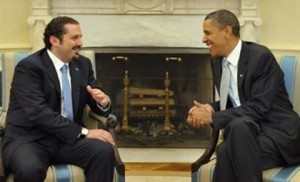 Robin Young had me on her show Thursday to discuss my oped in The New York Times. At the end she asked me what would change if the United States changed its policy and started engaging Hezbollah. In this case, I guessed, nothing; dialogue might give the U.S. more information that it currently has, and more insight into Hezbollah than it currently possesses, but little else.
Robin Young had me on her show Thursday to discuss my oped in The New York Times. At the end she asked me what would change if the United States changed its policy and started engaging Hezbollah. In this case, I guessed, nothing; dialogue might give the U.S. more information that it currently has, and more insight into Hezbollah than it currently possesses, but little else.
Click here for our conversation.
Justice deferred, or deterred?
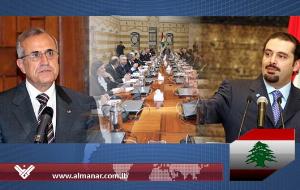 In Lebanon, crises unfold in unbearably slow motion until a sudden, usually deadly, climax. Everyone tunes out except for the participants and the hardened, usually professional, Lebanon-watchers; it’s all tedious process until somebody gets hurt.
In Lebanon, crises unfold in unbearably slow motion until a sudden, usually deadly, climax. Everyone tunes out except for the participants and the hardened, usually professional, Lebanon-watchers; it’s all tedious process until somebody gets hurt.
That’s what happened on Tuesday when Hezbollah forced a government collapse. It sounds dramatic, and it’s a critical point in the slow boiling showdown that’s simmered for years over the International Special Tribunal on the Lebanon assassinations. Hezbollah toppling the government is just an incremental step, although a major one, in the process by which Hezbollah will try to fatally cripple the Tribunal and render Hariri incapable of governing.
Saad Hariri inherited the premiership five years after his father was murdered. In a measure of the molasses pace of Lebanese politics, it took Hariri five months to negotiate a coalition cabinet; that government barely lasted 14 months.
There are only a few viable ways for this to turn out.
1. Hariri could fully repudiate the Tribunal, withdraw Lebanese support for it, and let it die on the vine. Even if Hezbollah members are indicted, nothing will come of it. This outcome, I think, is unlikely, only because it leaves Hariri with nothing – no actual power, and no legitimacy.
2. Hariri could insist on supporting the Tribunal. Hezbollah would be forced to escalate, and might eventually use violence as it did in May 2008, when it briefly conquered West Beirut. In this case, the Tribunal would be scuttled as well, but Hariri would preserve integrity and therefore political legitimacy. In an op-ed in today’s New York Times, I argue that Hariri is most likely to pursue this course.
3. Lebanon could limp on under a caretaker government for a year or two (like it did for long stretches in 2007 and 2008), unable to cooperate with the Tribunal, scuttle it, or make any controversial decisions. This is also a very likely scenario, as David Kenner writes at Foreign Policy.
4. Hezbollah could manage to form a government with a pro-Resistance prime minister, a scenario that would probably quickly spark a war with Israel, as Juan Cole points out today.
5. Hezbollah could decide to throw some bones to the Tribunal, under pressure from Syria and/or Iran. This outcome is the least likely; there doesn’t seem to be any pressure coming from Hezbollah’s patrons to moderate in the showdown over the assassinations, in all likelihood because neither state would benefit from a full accounting of the string of murders in Lebanon that began with the Hariri killing. The entire Axis of Resistance benefits from a confrontation that strengthens Hezbollah, weakens a government allied to Saudi Arabia and the United States, and which blames Israel for all the killings in Lebanon in a scenario that stretches credulity for all audiences except the partisans of Hezbollah.
The only scenario we’re unlikely to see is one is the “full justice option”: the International Tribunal releases compelling evidence about the assassinations of Rafik Hariri and all the other anti-Syrian figures murdered since 2005; the most important suspects are arrested and put on trial; and the powerful entities with stakes in Lebanon honor the judicial process and accept its outcome. That scenario is only a dream.
On Australian Radio
Listeners in Sydney, Australia today got to hear Mark Colvin’s of ABC’s PM program talk with me about Hezbollah’s likely reaction to indictments of its members in the Hariri assassination. You can, too, on their webcast, available here.
If War Comes, Indeed
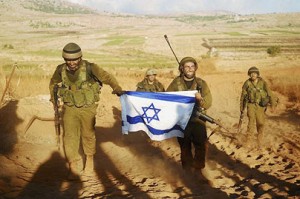 More than a month after skimming it, I have had the time to carefully read Jeffrey White’s paper on what a new war between Hezbollah and Israel might look like. “If War Comes: Israel vs. Hizballah and Its Allies,” a Washington Institute for Near East Policy publication, contains reams of useful information about the military tactics that parties to another Lebanon war might employ. However, White builds his argument on some misunderstandings and highly debatable assumptions about actors other than Israel. His analysis ignores much of the history of Israel’s last 30 years of war. And it fails to imagine any of the creative measures Hezbollah and its allies might take in another conflict.
More than a month after skimming it, I have had the time to carefully read Jeffrey White’s paper on what a new war between Hezbollah and Israel might look like. “If War Comes: Israel vs. Hizballah and Its Allies,” a Washington Institute for Near East Policy publication, contains reams of useful information about the military tactics that parties to another Lebanon war might employ. However, White builds his argument on some misunderstandings and highly debatable assumptions about actors other than Israel. His analysis ignores much of the history of Israel’s last 30 years of war. And it fails to imagine any of the creative measures Hezbollah and its allies might take in another conflict.
White’s main arguments are:
- Israel and Hezbollah both want a rematch from the inconclusive 2006 war.
- The next time around the stakes will be higher: both sides will fight for a decisive result.
- Hezbollah’s relationships with Syria and Iran make it more likely that a conflict will escalate into a regional conflagration.
- At its conclusion, White argues, a devastating Israel-Hezbollah war could create major new political crises, leave Israel occupying some of Lebanon and possibly all of Gaza, and destroy extensive civilian infrastructure – but he says it might also “break” Hezbollah military, weaken the Syrian regime, limit Iran’s influence, and weaken Hamas.
It’s definitely worth reading, and Andrew Exum posted his own very perceptive response to the paper on his blog. I want to amplify some similar questions and criticisms.
Fundamentally, White doesn’t account for the political reality of Lebanon today: Hezbollah has won the support of 1 million or more Lebanese, and achieved a statistical tie in the last elections. As a result, Hezbollah controls one-third of the government ministries, enjoys warm collegial relations with the president, the Lebanese Army, and much of the state’s institutions, and holds not only veto power but provides counsel to the weak government helmed by Saad Hariri.
Furthermore, Hezbollah has effectively silenced those forces in Lebanon that question Hezbollah’s right to manage its own militia, independent from the government’s army. Any attack by Israel on Lebanon – especially one that involveds widespread bombing of civilian infrastructure in particular in areas populated by Lebanese who oppose Hezbollah – will only renew Hezbollah’s legitimacy and expand its dominance over Lebanese politics.
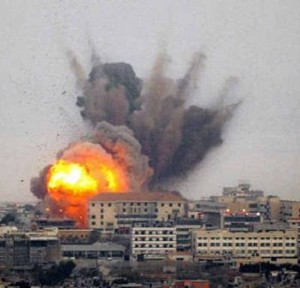 There is simply no outcome of a war that, as White imagines, could leave Hezbollah “broken as a military factor in Lebanon and weakened politically.” (To “break” Hezbollah would require Iran and Syria to end their partnerships with it.) Hezbollah’s military prowess depends on a few thousand fighters and relatively low-tech armaments that Iran and Syria can resupply at little cost. Hezbollah’s staying power stems from the web of influence it has built with its militia, its politicians, its network of social and educational institutions, and its increasingly potent ideology of Islamic Resistance.
There is simply no outcome of a war that, as White imagines, could leave Hezbollah “broken as a military factor in Lebanon and weakened politically.” (To “break” Hezbollah would require Iran and Syria to end their partnerships with it.) Hezbollah’s military prowess depends on a few thousand fighters and relatively low-tech armaments that Iran and Syria can resupply at little cost. Hezbollah’s staying power stems from the web of influence it has built with its militia, its politicians, its network of social and educational institutions, and its increasingly potent ideology of Islamic Resistance.
In passing, White invokes other assumptions that at best raise enormous questions and problems:
- He suggests that after another war Israel will occupy part of Lebanon and perhaps all of Gaza. Israel’s troubling experience doing so in the past led it to unilaterally withdraw from Lebanon in 2000 and Gaza in 2006. What does White think has changed to make occupation of these areas more sustainable or effective for Israel?
- In 2006, Israel thought that holding all of Lebanon accountable for the behavior of Hezbollah would weaken Hezbollah and strengthen its opponents. The opposite happened, and Hezbollah emerged stronger than ever before. Why would the same course of action by Israel this time produce different political results?
- The case for an expanded war depends on a calculus that Hamas, Syria and Iran might be drawn into a war, directly, if they believe Hezbollah is losing. An alternate interpretation suggests that none of those actors would have an incentive to directly involve themselves in an Israel-Lebanon war, especially if they believe that Hezbollah wins politically no matter what the outcome on the battlefield. (In my estimation, a Hezbollah that resists and survives to fight again wins politically even if its military forces are decimated.) The behavior of the “Axis of Resistance” parties in Operation Cast Lead (2008-2009), the 2006 Lebanon war, and previous crises, suggests they see no need for overt involvement in a time of hot war in order to cash in on the political benefits of being allies afterward.
- What of Israel’s cost in diplomatic support and strained relations if it engages in the kind of speedy and widespread campaign White describes? “War on this scale may come as a chock to some of Israel’s supporters, and to countries and organizations under the spell of ‘proportionality,’” he writes. Indeed, such a war could cost Israel vital support domestically, and in the United States, not to mention bringing it approbation and possible legal action supported by parties “under the spell of ‘proportionality,’” like the United Nations and the United States, whose military hews to that principle in its own laws of war.
- Iran and Syria gain from Hezbollah’s willingness to fight Israel, and its presumed survival of such a conflict. They have little to gain from a frontal military confrontation with Israel, and would likely be content to sit on the sidelines, frustrating any attempt to expand a war and fulfill the almost Polyanna-ish hopes to “reorder” regional politics, critically weaken all of Israel’s enemies in a single war, and “shatter” Hezbollah’s “myth of resistance and military power.”
There are lots of other questions worth asking, including whether analysts should take Israel’s war in Gaza as a fair preview of a conflict with a major opponent like Hezbollah.
Andrew Exum very graciously questioned White’s assumptions in his response to the paper at WINEP in September, and pointed out that the entire exercise seems to concentrate on the minutia of military tactics at the expense of examining the overall political and strategic context.
The analysis betrays a common Achilles Heel I’ve encountered while reporting on the Middle East – a real lack of familiarity with the governments, militant movements, and public sentiments in Arab states and in Iran. Many Hezbollah supporters I interview read Haaretz on line, study Hebrew, and read books like Ariel Sharon’s autobiography. They might not understand Israel and Israeli society, but they try, and their attempts at self-education have translated into adaptive tactics and strategy. Meanwhile, supporters of Israel all too often forget to question their own assumptions, make critical assessments of Israel’s enemies, or update those assessments as those enemies evolve. As a result, they can fall into analytical traps, misapprehending the motives of their opponents, their levels of public support, and the likely political consequences of applying military force to them.
If I understand White correctly, he’s arguing that next time Israel goes to war on its northern border, Israel should apply lethal, overwhelming, widespread military force to Lebanon, and it should be prepared to simultaneously do so to Gaza, Syria, and Iran. Such a venture, White argues, would probably leave Israel in a stronger position.
Reality, and the experience of Israel’s last wars, suggests the opposite. Widespread conflict would probably not leave Israel more secure, and would at the same time unleash manifold waves of unintended consequences. As the United States learned from its venture in Iraq, upending the card table doesn’t necessarily lead to better hands in the next game.
Jeffrey White hasn’t provided any compelling reasons why Israel would emerge in dramatically better condition than it is in today after a massive war against Lebanon, Syria, Gaza and Iran, and he certainly hasn’t provided any evidence (historical, comparative, analytical) that war in 2011 would play out differently than it did for Israel in 2009, 2006, 2000, 1996, 1993, and 1982.
He has, however, given us a glimpse of the kind of pie-in-the-sky assumptions needed to convince an American audience that a high-risk, expeditionary, regional war might yield great, unspecified consequences – without accounting for the chilling risks such a war carries for millions of Arabs, Israelis, and for U.S. interests in the Middle East.
Hitchens on Hezbollah
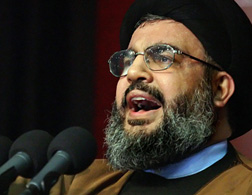 Christopher Hitchens on Slate laments Hezbollah’s renaissance in Lebanon. He blames two main factors: Israel’s “crass intervention in Lebanon in 2006,” and the United States unwilligness to take an interest in Lebanon. To his list I’d add a few other reasons: the absence of a coherent and compelling alternative to the “Axis of Resistance”; massive corruption and/or incompetence among so-called moderates; and the puzzling failure of non-militant movements to use religion to mobilize mass support.
Christopher Hitchens on Slate laments Hezbollah’s renaissance in Lebanon. He blames two main factors: Israel’s “crass intervention in Lebanon in 2006,” and the United States unwilligness to take an interest in Lebanon. To his list I’d add a few other reasons: the absence of a coherent and compelling alternative to the “Axis of Resistance”; massive corruption and/or incompetence among so-called moderates; and the puzzling failure of non-militant movements to use religion to mobilize mass support.
Very kindly, Hitchens also mentions A Privilege to Die:
A depressingly excellent book on the contours of that new reality is provided by Thanassis Cambanis. A Privilege To Die lays out the near-brilliant way in which Hezbollah manages to be both the party of the downtrodden and the puppet of two of the area’s most retrograde dictatorships. Visiting Beirut not long after Hezbollah had been exposed as an accomplice to Syria and as the party that had brought Israel’s devastating reprisals upon the innocent, I was impressed, despite myself, by the discipline and enthusiasm of one of Nasrallah’s rallies in the south of the city. Cambanis shows how the trick is pulled. With what you might call its “soft” power, the Party of God rebuilds the shattered slums, provides welfare and education, and recruits the children into its version of a Boy Scout movement, this time dedicated to martyrdom and revenge. With its “hard” power, it provides constant reminders of what can happen to anyone who looks askance at its achievements. Its savvy use of media provides a continual menu of thrilling racial and religious hatred against the Jews. And its front-line status on Israel’s northern frontier allows it to insult all “moderate” regimes as poltroons and castrati unwilling to sacrifice to restore Arab and Muslim honor. Many Sunni Arabs hate and detest Hezbollah, but none fail to fear and thus to respect it, which Nasrallah correctly regards as the main thing.
On “The World”
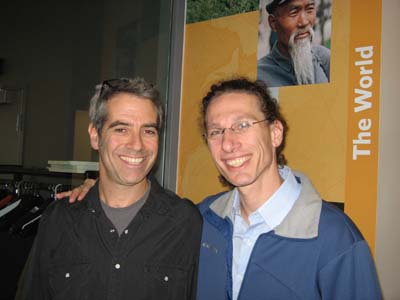 One of my favorite radio programs, The World (from WGBH, the BBC and PRI), had me on last Friday to talk about why people join Hezbollah and what the Party of God means to its million-plus followers. Marco Werman asked great questions, leading to a discussion of people in Hezbollah, and focusing again on Faris Jamil, who left Manhattan because of all the crime and drugs.
One of my favorite radio programs, The World (from WGBH, the BBC and PRI), had me on last Friday to talk about why people join Hezbollah and what the Party of God means to its million-plus followers. Marco Werman asked great questions, leading to a discussion of people in Hezbollah, and focusing again on Faris Jamil, who left Manhattan because of all the crime and drugs.
“I couldn’t raise my kids there!” Faris Jamil told me. Instead he moved to Aita al Shaab in south Lebanon, about a mile from Israeli border. Certain war seemed a small price to pay to raise his children in the cradle of the Islamic Resistance.
From an American perspective, it might not make sense why a successful businessman like Faris would prefer the cycles of destruction in southern Lebanon to the prosperity of New York. A big part of the explanation is also goes a long way toward explaining Hezbollah’s appeal: personal identity.
Hezbollah’s Boy Scouts
Where can you learn how to brush your teeth well, tie a knot, articulately recite a Hassan Nasrallah speech, and if you’re lucky, how to join the war against Israel? The answer is the Mahdi Scouts, Hezbollah’s contribution to the international scouting movement. Drawing liberally on Western scout movements as well as the Iranian revolution, Hezbollah has put together a dynamic movement that effectively instills its ideology and tactics in the very young. The Mahdi Scouts showcase Hezbollah’s dual approach — building community through religion and at the same time, mobilizing their devotees through an appeal to fight a unifying enemy.
This extract from A Privilege to Die published today in Foreign Policy describes the day I spent with a Mahdi Scout troop in Khiam.
Mohammed Dawi, the sweaty and plump scout leader, met us at the entrance to Khiam town. He was a redhead with freckles, and looked more Irish than Lebanese. The younger scouts were waiting in the basement of a high school a mile or so from the prison. The troop leader led them in a chant of welcome. Most of them wore blue shirts with epaulets, white scarves, and oversized badges featuring a photograph of a scowling Ayatollah Khomeini. Two boys who looked about ten wore full military fatigues.
It seemed the day’s activities had been planned with my visit in mind. The children marched downstairs single file and broke up by age group. The “buds,” six or seven years old, assembled for a puppet show, emceed by a man in a worn panda suit who sang lines from Nasrallah’s speeches. The “sprouts,” eight to ten years old, sat around tables at the rear of the room drawing pictures, their ideas inspired by a chubby and soft-spoken young woman named Malak Sweid. She was a graphic design student and zealous party apparatchik.
In “guided drawing,” the kids drew pictures of Israelis weeping in defeat, denoted by Stars of David on their helmets, or of Israelis stepping on Lebanese. Other children, with evident direction by Malak, depicted crosses and crescents, symbolizing the Lebanese Christians and Muslims, chained by vicious Stars of David. Other pictures spoke less to the conflict with the Jews than to Islamic values. One child’s picture showed women in low-cut gowns holding martini glasses and cigarettes in old-fashioned holders. “Smoking Harms Your Health” was the title.
The Enemy Becomes You
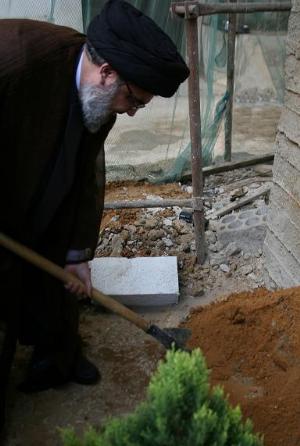 I’d wondered for a long time about Hezbollah’s tree-planting program. Once when I spent the day with a Mahdi Scout troop the boys planted a bank of cypress trees as a windbreak by a Khiam playground, but I hadn’t encountered a lot of arboreal work.
I’d wondered for a long time about Hezbollah’s tree-planting program. Once when I spent the day with a Mahdi Scout troop the boys planted a bank of cypress trees as a windbreak by a Khiam playground, but I hadn’t encountered a lot of arboreal work.
In fact Hezbollah plants trees big time; Hassan Nasrallah appeared in public on Saturday for the first time in years to plant what the party claimed was its millionth sapling in the Dahieh, Beirut’s southern suburb. When it comes to symbolism (and institution-building), Hezbollah has openly borrowed from Israel and the early Zionist movement. Tree-planting and reforestation have been tremendously effective in Israel, both from a practical standpoint and as a way of cultivating popular attachment for the land. No simple is more apt (or as compelling, perhaps) as a little sapling taking root, firming up, and growing into a tree. It seemed like a no-brainer that Hezbollah would incorporate tree-planting into its tactical canon.
I first noticed the story reported by Alistair Lyon of Reuters, then quickly found links to the report on Hezbollah’s Al-Manar website, which broadcast the planting near Nasrallah’s house.
Jihad al Binaa, or the Holy Struggle for Reconstruction, spearheaded the urban tree-planting campaign over the last few months, Nasrallah said on Al-Manar:
“We wanted to plant this tree in this particular place, near our residence in Haret Heriek, which was destroyed during the 2006 war, to address every citizen and say: If every Lebanese plants a tree next to his house and pledged to take care and preserve it, imagine how our country would look like.”
Indeed. Lebanon could use more trees, and the congested confines of the unplanned, overcrowded Dahieh in particular could use anything to improve quality of life.
The Next War
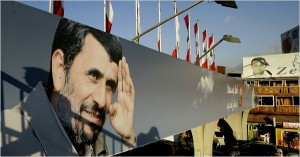 How eager is Hezbollah for another conflict with Israel? On my last trip to Lebanon in September, I found both Hezbollah’s officials and the party’s rank and file feeling ready — bristling for a rematch, confident if not precisely eager. Hezbollah officials said they had doubled their fighting ranks (one said the number had tripled) since 2006. Supporters living in the border regions, like Aita al Shaab, said they had finally fully recovered from the last war and felt ready to fight again.
How eager is Hezbollah for another conflict with Israel? On my last trip to Lebanon in September, I found both Hezbollah’s officials and the party’s rank and file feeling ready — bristling for a rematch, confident if not precisely eager. Hezbollah officials said they had doubled their fighting ranks (one said the number had tripled) since 2006. Supporters living in the border regions, like Aita al Shaab, said they had finally fully recovered from the last war and felt ready to fight again.
Hezbollah supporters who time and again have lost their homes and livelihoods seem to embrace continued confrontation. What’s more, based on what they told me, they believe they’ll emerge at least as strong — politically and strategically — from another war as they did in 2006, even though nearly all of the people I interviewed thought the next conflict would be apocalyptic in its ferocity.
Lebanon has become even more polarized than it was in the years immediately after the 2006 war. Then the split worsened between those who support Hezbollah’s approach to Islamic Resistance and those who espouse a less confrontational course (and hold a majority in the government). There used to be a substantial pool of Lebanese in the middle; they wanted non-sectarian, non-confrontational politics for their country but who also sympathized with Hezbollah’s resistance project. By now, though, it seems that the soft middle has largely vanished. Most of the people I talked to were quite emphatic, either in their absolute loyalty to Hezbollah or in their absolute conviction that Hezbollah was ruining Lebanon.
I wrote about Hezbollah’s view of the coming conflict in today’s Times.
AITA AL SHAAB, Lebanon — It was from this shrub-ringed border town that Hezbollah instigated its war withIsrael in 2006, and supporters of the militant Shiite movement sound almost disappointed that they have not fought since.
“I was expecting the war this summer,” said Faris Jamil, a municipal official and small-business owner. “It’s late.” He has yet to finish rebuilding his three-story house, destroyed by an Israeli bomb that year.
In 2006, Hezbollah guerrillas crossed the border a few hundred yards from the town center, ambushed an Israeli patrol and retreated through Aita al Shaab with the bodies of two Israeli soldiers.
Hezbollah officials and supporters said they were now sending a pointed message to Israel through their efforts to rebuild, repopulate and rearm the south.
“We are not sleeping,” said Ali Fayyad, a Hezbollah official and member of Parliament. “We are working.” He receives visitors every weekend in a family home in Taibe, the site of a deadly tank battle in 2006.
Four years later, Hezbollah appears to be, if not bristling for a fight with Israel, then coolly prepared for one. It seems to be calculating either that an aggressive military posture might deter another war, as its own officials and Lebanese analysts say, or that a conflict, should it come, would on balance fortify its domestic political standing.
Rapture, Resistance, Revolution
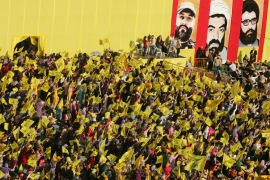 In his review of A Privilege to Die for Global Post my friend the mystery writer (and veteran Middle East hand) Matt Beynon Rees calls attention to one the main endeavors of the book: to place front and center the regular Joes and Janes (or Ranis and Farahs) that have elevated Hezbollah into a perennial and expanding trend-setting militant movement.
In his review of A Privilege to Die for Global Post my friend the mystery writer (and veteran Middle East hand) Matt Beynon Rees calls attention to one the main endeavors of the book: to place front and center the regular Joes and Janes (or Ranis and Farahs) that have elevated Hezbollah into a perennial and expanding trend-setting militant movement.
Hezbollah’s rank-and-file, the footsoldiers and volunteers, aren’t always scheming against Israel or dreaming of perpetual war; they’re also strivers looking for better jobs, education for their kids, and a more honest relationship with God.
Because of its growth and success on the battlefield, the Party of God itself often takes on mythic status. Outsiders sometimes impute far greater cunning, skill and sophistication to Hezbollah than its occasionally clunky and authoritarian behavior merits.
Matt re-tells one of the more amusing encounters I had with Hezbollah while reporting the book:
Unsatisfied with one of his stories, Hezbollah officials denied his book the cooperation of the Party of God (“Hizb” means party in Arabic; “Allah” you probably heard of already.) He describes one party functionary telling him, “‘You can’t possibly write a book about Hezbollah without the party’s permission, right? You’ll have to move on to another project?’ Like many Hezbollah officials she overestimated the party’s ability to control or manipulate a foreigner like me and she thought the prospect of future access would tempt me to relinquish writing this book.”
Tribunal bedeviling Hezbollah
 In the kind of notoriety that really excites a geek like me, my favorite blogger on Lebanon has interviewed me about A Privilege to Die. Qifa Nabki talked to me about what it is, exactly, that I’m writing and arguing about Hezbollah, and delves into some of his favorite topics – like Hezbollah’s influence on the wider Arab world and the social-ideological recipe that distinguishes Hezbollah from other mass-mobilization Islamist movements.
In the kind of notoriety that really excites a geek like me, my favorite blogger on Lebanon has interviewed me about A Privilege to Die. Qifa Nabki talked to me about what it is, exactly, that I’m writing and arguing about Hezbollah, and delves into some of his favorite topics – like Hezbollah’s influence on the wider Arab world and the social-ideological recipe that distinguishes Hezbollah from other mass-mobilization Islamist movements.
He asks how Hezbollah might respond if the International Special Tribunal investigating the 2005 murder of former Lebanese Prime Minister Rafik Hariri were to indict some Hezbollah members.
During my reporting trip to Lebanon in September I was surprised by Hezbollah’s uncompromising position on this issue. Party officials whom I interviewed echoed their leader Hassan Nasrallah’s absolutist stance: Hezbollah wouldn’t turn over any members, Hezbollah wouldn’t even recognize the Tribunal’s authority, and Hezbollah would ask the rest of the Lebanese government to adopt Hezbollah’s position.
If Hezbollah sticks to its guns on this issue, so to speak, it could quickly escalate into internal violence. During the crisis from 2006 to 2008, Hezbollah could argue that it was willing to negotiate so long as the other political parties in Lebanon were willing to give Hezbollah the one-third of power it was due demographically and by its share of seats in parliament. In the event of a Tribunal indictment of Hezbollah operatives, however, Hezbollah will find itself in a complicated position. If the indictment presents compelling evidence, Hezbollah will find its pure image substantially tarnished. And if Hezbollah is willing to withdraw from the government and go to war against it, rather than surrender any indicted members, it will risk alienating a broad segment of the Lebanese public that until now has supported Hezbollah’s Islamic resistance project, or at least, not stood in its way.
Elliott Abrams, Hezbollah and my book
I plan to write about the moderated conversation with Elliott Abrams, Brian Katulis and me on Thursday, but I wanted immediately to put up the video of the event, from the Center for American Progress website. You can watch it below or on their site.
